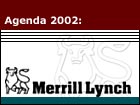|
A new sheriff in town
|
 |
February 14, 2002: 11:16 a.m. ET
O'Neal calculates change in Merrill's operations, at home and overseas.
By Suzanne Woolley with Amy Feldman
|
NEW YORK (Money Magazine) - The man remaking Merrill works on the 32nd floor of 4 World Financial Center in downtown Manhattan. From this perch, he has a view of both the Hudson River and the raw earth once covered by the World Trade Center buildings.
Appropriately for this vigorous man of action, O'Neal's office features a photograph of himself in a downhill ski race, and he keeps a treadmill in an adjacent room. There are also pictures of his wife Nancy and their 10-year-old twins, books like The World of Professional Golf 2000 and Be Your Own Mentor, plus a framed brightly colored African textile and a collection of stone sculptures from Zimbabwe.
O'Neal is often described as coolly cerebral. But during our mid-January discussions, he was warmer and more down-to-earth than that image suggests, and he radiated an aura of powerful self-assurance.
Asked about his ascent from Wedowee, Ala., he joked wryly, "This is the 'log cabin' part of the article." For all his clout, O'Neal remains keenly aware of the world he came from. He speaks with great pride of his father's struggles to raise four kids as a manual laborer in the segregated South. "What he always did was try to tell me that there were possibilities beyond what I thought," says O'Neal. "And he had a lot of faith in me."
O'Neal also acknowledges his debt to another American business icon, General Motors, for which his father worked on an assembly line after the family moved to Georgia. O'Neal earned his undergraduate degree through a GM-sponsored program that involved alternating six weeks at a GM plant and six weeks at General Motors Institute (now Kettering University).
After graduation, O'Neal worked as a supervisor in the same GM factory as his dad, then attended Harvard Business School on a GM-funded scholarship. He earned his M.B.A. with honors, returned to GM and rose rapidly through the ranks, holding financial management positions in New York and Madrid and eventually working on GM's mergers and acquisitions.
In 1986, O'Neal joined Merrill Lynch's investment banking division, and he's since cycled through nearly every business line at the firm, including two years as chief financial officer and 16 months running Merrill's crown-jewel retail brokerage unit.
On paper, O'Neal's rise to power looks almost methodical, and today his approach to remaking Merrill appears similarly strategic. In a nutshell, he's obsessed with making Merrill run in a more businesslike way -- imposing rigor on what had become a bloated and inefficient organization. Instead of pursuing grandiose initiatives, O'Neal wants Merrill to concentrate on areas it knows well and can dominate -- and, in the process, he's determined to ramp up its profitability.
"For a time, Merrill lost sight of where it was going," explained Michael Flanagan of Financial Service Analytics. "It got a little sloppy. Now it's tightening up its focus." O'Neal, with his ruthless emphasis on the bottom line, was the logical choice for the job, said Flanagan.
There's no better example of this than what O'Neal has done overseas. CEO Komansky's grand vision for Merrill led him to make a slew of aggressive investments around the globe, starting in the U.K. In Japan, for example, he acquired 33 retail brokerage branches and 2,000 employees from Yamaichi Securities, which had gone bankrupt.
"We had hoped we could drive a new paradigm in the Japanese market and develop a more client-focused business," recalled Komansky. Instead, Merrill's Japanese retail operations ended up losing about $100 million a year as the country's stock market and economy continued to disintegrate. "The timing was lousy, terrible," admitted Komansky. "And we made a lot of mistakes in conceptualizing the business."
In January 2002, O'Neal closed 20 of Merrill's branches in Japan and cut 1,200 employees. The big mistake, he said, was to think Merrill could so easily "export" its "mass-market, full-service kind of brokerage model."
Likewise, he took a cold-hearted look at Merrill's retail operations in countries like Australia -- and eviscerated them: "Even if we're successful beyond our wildest imagination in Australia in the wealth-management space, it's not going to make a big difference to Merrill Lynch overall." So he'd rather focus on the more profitable business of serving Australian institutions.
"Stan clearly has the courage to drive change," observed Komansky, sitting in his private conference room, which is filled with masks, puppets, carvings and scrolls that he collected on innumerable trips to Asia. But it obviously rankles to see O'Neal discard pieces of the global empire that Komansky had so proudly assembled.
"I do hope," said the 62-year-old Komansky, "that when I retire, my successors have the courage to continue to build into markets that it takes some courage to build into -- and have the ability to wait out success."
Page 3: Read about O'Neal's goals for the future.
-Additional research by Adrienne Carter 
|
|
|
|
|
|

|

